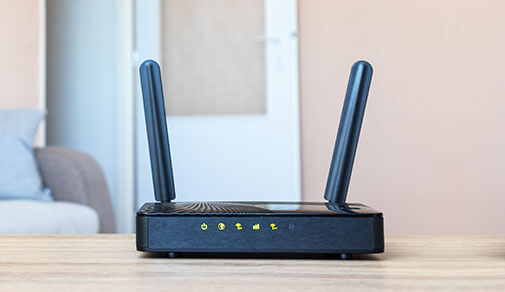Modem vs. Router : Know the pros and cons
-
257
-
28 Sep 2020
-
4 minutes

Modem and router are co-occurring terms in many scenarios, such as setting up an internet connection in a home or office. However, the modem and the router are two different entities that connect to the internet in the most basic manner. Clarity about these disparities is important when selecting a device or combination that fits one's needs. This guide distinguishes between a modem and a router, comparing cable modems and routers as single entities or separable devices.
What Does a Modem Do Vs Router
Although a modem and a router resemble each other in some ways, they are two distinct devices with completely different roles in establishing an internet connection. Let’s look at what does a modem do vs router.
Modem
The modem is the equipment that provides connectivity between your home or office and your Internet Service Provider. It converts digital signals to a format your machine can understand so you can connect to the Internet. Without a modem, you cannot connect to the Internet.
- Internet connection establishment links to an Internet Service Provider.
- It connects using a coaxial cable, a DSL line, or fibre optics.
WiFi Router
It divides the Internet from the modem into several devices by creating a local-area network within your house or office. Almost all of the latest routers have WiFi technology, making connecting wireless devices to the Internet feasible.
- Shares internet with multiple devices.
- Connect to the modem via the Ethernet cable.
A modem is your gateway to internet access, while a router disseminates that access to devices.
What is a Cable Modem vs Router?
Cable modems and routers serve distinct purposes but are specifically tailored for cable internet connections. Let’s look at what is a cable modem vs router.
Cable Modem
A cable modem uses coaxial cable connections to the internet made available by a company, such as Airtel, ACT, or Jio. Generally, the cable modem uses signal processing capability to provide a high-speed Internet connection, where such a feature is likely available in most broadband modem plans. Visit our page and select your city to get started today!
- Establishes Internet Connection through Cable Service Provider.
- Generally supports download speeds of between 100 Mbps and 1 Gbps.
Router for Cable Modems
If you own a cable modem router, you can build a WiFi network or WiFi network couple of computers with the help of using.
- Distributes the internet from the cable modem to your devices.
- Includes advanced settings for network management and WiFi capabilities.
What is Modem vs Router Difference?
To further clarify, let’s look at the specific roles each device plays:
Modem
- Establishes and maintains a connection with your ISP.
- Provides a single IP address to your network.
- Enables wired internet access through an Ethernet port.
Router
- Creates a local network within your home or office.
- Shares the internet connection among multiple devices.
- Provides WiFi access for wireless devices.
- Offers security features like firewalls and parental controls.
Combined Modem and Router vs Separate Devices
For your internet connection, you are often made to choose the option that combines modem and router vs separate devices. Let's analyse the good and the bad of each choice:
Combined Modem-Router
A combined modem router is a single device that serves both modem and router functions.
Advantages
- It occupies less space
- It simplifies setup and reduces the number of cables needed.
- It is often cheaper than buying separate devices.
Disadvantages
- It may not offer the same kind of performance as other devices.
- If one component becomes outdated, you must replace the entire unit.
Separate Modem and Router
Using separate devices means having a dedicated modem and a separate router.
Advantages
- Offers better performance and advanced features, especially for heavy internet usage.
- You can upgrade one device without affecting the other.
- Allows you to choose devices tailored to your needs, such as high-speed broadband modem plans.
Disadvantages
- Requires a more involved setup.
- Takes up more space and is usually more expensive upfront.
How to Choose the Right Option for Your Needs
Things to consider when making the differentiation between a combined unit and separate devices are:
- Internet Usage
Light Usage: A combined modem-router may suffice if you have minimal internet needs, such as browsing and streaming.
Heavy Usage: For gaming, video conferencing, or multiple connected devices, separate devices offer better performance.
- Internet Speed
Ensure your device supports the speed provided by your broadband modem plan. High-speed plans often require advanced routers for optimal performance.
- Coverage Area
A separate, high-quality router ensures better WiFi coverage for large homes or offices.
- Budget
If cost is a concern, combined units are more budget-friendly. However, investing in separate devices may save you money in the long run by allowing easier upgrades.
- Technical Expertise
A combined device is more convenient if you prefer a simple, plug-and-play solution. Tech-savvy users may appreciate the flexibility and control offered by separate devices.
Conclusion
Understanding the modem vs router difference is key to building a reliable internet setup. While one brings you online, the other bridges devices to multiples at a time.
For cable modem Internet users, the choice between a cable modem and a compatible router depends on the needs and plans of the particular broadband modem. Deciding on a combined modem-router unit or separate devices requires balancing performance, coverage, and budget.
Investing in the best in your equipment - for example, keeping the best WiFi router for home - ensures that you stay connected, safe, and happy with your internet connection. Make that bright decision today to wake up tomorrow feeling the smooth equivalence of your connectivity.






